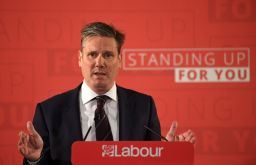The summer is over and Britain’s lawmakers are back in Westminster, with Brexit taking center stage.
Over the next few months, Britain’s departure from the European Union will start to gather pace as MPs vote on a host of bills and amendments.
The debate on what’s known as the European Union (Withdrawal) bill – designed to transfer EU law into UK legislation upon the country’s departure from the bloc in March 2019 – began Thursday, ahead of a vote next week in the House of Commons.
The next round of Brexit talks, party conferences and the upcoming German election could all have some effect on the process.
All of this comes after a tumultuous few months for Britain’s embattled Prime Minister Theresa May, whose position remains the source of constant rumor and speculation.
May defiant
May has been under increasing pressure since June’s election, at which her Conservative Party lost its governing majority and was forced to make a deal with the Democratic Unionist Party of Northern Ireland to remain in power.
Last week May dismissed reports claiming she would quit in 2019 and insisted she was looking forward to the 2022 election.

But British newspapers have been full of stories claiming that some of her own members of Parliament want her to step down, while various names have been touted as replacements.
Her latest challenge is steering the European Union (Withdrawal) bill through Parliament, with Labour set to oppose it and plenty of MPs aiming to make amendments when it’s debated in the Commons for the first time.
Second reading of the EU (Withdrawal) bill
In addition to codifying existing EU laws, the bill also means that the UK will no longer have to adhere to new laws made in Brussels beyond March 2019.
But the government intends to use controversial laws from the time of King Henry VIII to enact corrections to the statute book, prompting opponents to complain of a “power grab.”
MPs from both sides of the house have questioned the use of the powers, which will allow the government to change large amounts of former EU law without the Commons’ permission.
The government says those powers will not be used for any significant changes but rather for technical amendments and for a limited time.
Labour says using those statutes will give the government “sweeping powers to change laws by the back door.”
According to the government, the provision is necessary to make sure that it can transfer around 1,000 pieces of EU law over to British law before the departure date.
Read: How Henry VIII will help Theresa May navigate EU divorce
Labour has said it will vote against the bill, but whether any Tory rebels will join it remain to be seen.
Keir Starmer, the shadow Brexit secretary, has said that his party will not vote for the Bill because it will allow ministers to make sweeping changes to legislation without parliamentary scrutiny.

“We are reaching the stage of negotiations where fantasy meets brutal reality,” Starmer told the House of Commons Tuesday. “Too many promises have been made about Brexit which can’t be kept.”
The party wants to introduce a number of amendments and has also changed its stance to support remaining in the single market and customs union during a four-year transition period.
Read: Brexit presents unprecedented opportunities for Britain and the US
Labour would also accept free movement of people during the transition phase as well as paying into the EU budget and accepting the jurisdiction of the European Court of Justice during the four years.
But while Labour, Liberal Democrats and Scottish National Party are likely to band together to vote against the bill, May should have the numbers to pass it.
The legislation will then pass onto the committee stage in the House of Commons in October where amendments are likely to be added under pressure from backbench Conservatives and opposition MPs.
Brexit talks
Victory in the Commons would be a welcome boost for May with Britain enduring a difficult start to negotiations with Brussels, highlighted by the frosty encounter last week between Brexit Secretary David Davis and his European counterpart Michel Barnier during their latest round of negotiations.
On that occasion, Barnier complained of “no decisive progress” in the negotiations and accused Britain of attempting to secure the “impossible” in its approach to leaving the single market while retaining its benefits.
Davis, meanwhile, has accused the EU of inflexibility, while International Trade Secretary Liam Fox said Britain would not be “blackmailed” to paying its way out of the bloc. The two sides have yet to come to an agreement over the Northern Irish border, the rights of EU citizens or Britain’s financial obligations.
“Nobody has ever pretended this would be simple or easy,” Davis told MPs Wednesday.
“We’ve always said this negotiation would be tough, complex and at times confrontational. So it has proved.”
A lack of consensus over key areas, such as an exit payment, means any attempts to move onto negotiating future trade are likely to be postponed.
The British government was forced to deny reports it had agreed to pay a £50 billion ($65 billion) “Brexit bill” to secure its departure, though Davis concedes that he expects the wrangle to go on for the “full duration” of the negotiations.
The two sides are set to meet again in the week beginning September 18 and October 9, but both have indicated they’re willing to step up the pace of the negotiations ahead of the EU summit in Brussels on October 19.
For May, who will attend her party’s annual conference in the first week of October, progress is crucial.
She will address party members in a bid not just to ensure she remains as leader but to convince them she is one to lead the party forward.
The next few months could be vitally important not just to Britain’s post-EU future but to see if May is still in Downing Street to see Brexit carried out.







